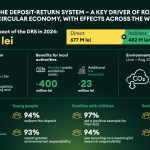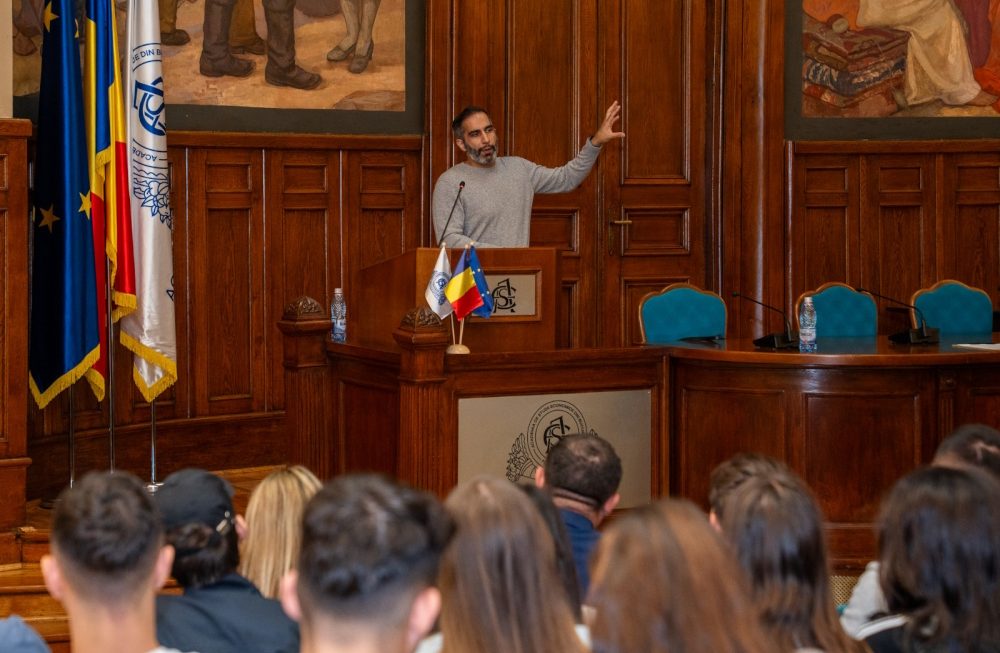
“Fit for 55”: rather unprepared!
Foto: robertsrob / depositphotos.com
“Fit for 55” is the ambitious title under which the European Union announces the continent’s “greening” during the next three decades. And “greening” means the liquidation of energy production units that use hydrocarbons as raw materials and therefore release huge amounts of carbon dioxide (CO2) into the atmosphere. Zero net emissions is the European Union’s specific target and consequently it becomes a mandatory target for each Member State.
Governments thus bear a great responsibility for how they manage the energy transition: encouraging zero-emission energy projects, supporting the business environment, involving citizens in the effort to reduce emissions and, above all, drawing up the necessary public policies. But Member States’ strategies are different and closely related to each country’s resources: natural resources, financial resources, technological and human resources. And governments’ strategies depend on how they build political alliances and economical partnerships to facilitate their transition to zero emissions. For the EU economy, it is important that the climate neutrality target is achieved in such way that it does not lose its competitiveness. This includes developing efficient measures to protect the Union from the competitive disadvantage compared to other countries without such ambitious climate policies. For the economy of each Member State, it is important that the zero emission target is achieved in such way that the citizen has everything to gain, does not harm national energy security and does not drive away investors.
But exactly the national energy security falls under question right now, on the eve of what is expected to be a very difficult winter for Europeans, with few energy resources available and at prices that seriously threaten the financial security of the population and industrial consumers. Many complain that natural gas is not recognized by the EU leadership for its true value and ability to support the transition to the green paradigm. “A fair green transition cannot be achieved without the contribution of natural gas,” said FPPG President Franck Neel. Against the background of intense debates at European level on the EU’s energy future, the Oil and Gas Employers’ Federation (FPPG) argues that it is essential to focus on what really matters, namely identifying the most efficient way to achieve the common target of climate neutrality by 2050. For the energy transition to be successful, Romania needs to use the competitive advantage provided by the availability of resources such as natural gas. Natural gas is an essential fuel for the sustainable transformation of economies with intensive coal consumption, and this is true not only for our country but also for Central and Eastern European countries. Natural gas is a viable, affordable and technologically mature alternative that can help significantly reduce greenhouse gas emissions. The transition to a sustainable energy mix in Romania can be ensured, for the most part, by gradually switching to electric power generation using natural gas, thus replacing coal. At the same time, we cannot ignore the opportunities for the future use of natural gas in mixtures with renewable and decarbonised gases and the potential of hydrogen from natural gas to support the decarbonisation pathway and the transition to a sustainable economy.
Romania still needs significant investment in improving regional energy interconnections, retrofitting infrastructure and replacing existing generation capacity, while trying to address the side effects of this transformation, which will be felt by people living and working in regions with intensive coal consumption. If the European green transition will be paired with poverty and lack of hope, then this policy will fail us all – industry leaders, political decision makers, social partners and NGOs – but first of all it will fail the European Union citizens. All over Europe (and therefore Romania) lack of natural gas pours gas on the fire of inflation making energy unaffordable for millions of citizens. The International Energy Agency (IEA) reports that “the acute shortage of natural gas, liquefied gas and coal supplies resulting from the recovery of the global economy has triggered a precipitous rise in energy supply prices and is triggering a massive switch to petroleum products”. The IEA points out that the acute shortage of natural gas is spreading to other markets and the global economy in general, and higher energy prices “are adding to inflationary pressures which, along with power outages, could lead to lower industrial activity and a deceleration in economic recovery.” In Europe, inflation (or even the hyperinflation) closely connected to oil (and energy) brings to power an empire of poverty, despite the promises of green and prosperous living constantly made by the current European Commission. Millions of people in the EU bloc (including, unfortunately, millions of Romanians) are suffering from poverty caused by rising energy prices, and the number will continue to grow, the European Commissioner for Jobs and Social Rights, Nicolas Schmit, recently warned. According to Schmit, the European Commission “could help” Member States limit the impact of very high electricity prices on the population, but “the obligation to take action” lies primarily with national governments.
Moreover, the European Commission adopted on 13 October this year a document on energy prices, a communication to address the unprecedented rise in global energy prices, which is expected to last throughout the winter, and to support European citizens and businesses. The Communication includes a set of measures that the EU and its Member States can take to address the immediate impact of rising prices and to further strengthen our resilience to future shocks. The European Commission has identified immediate measures to protect consumers and businesses: emergency income support for consumers affected by energy poverty, for example through vouchers or partial payment of bills, which can be covered by EU ETS revenues; allowing temporary postponement of the due date of bills; providing safeguards to avoid disconnection from the grid; providing temporary and specific reductions in tax and fees levels for vulnerable households; granting aid to companies or industries in line with EU state aid rules; strengthening international energy outreach to ensure transparency, liquidity and flexibility in international markets; investigating possible anti-competitive behaviour in the energy market and tasking the European Securities and Markets Authority (ESMA) to further strengthen the monitoring of developments in the carbon market; facilitating wider access to renewable energy procurement contracts and supporting them with accompanying measures. At the same time, medium-term measures to achieve a decarbonised and resilient energy system have also been defined in Brussels: stepping up investment in renewable energy, refurbishments and energy efficiency and streamlining renewable energy tenders as well as licensing and authorisation procedures; developing energy storage capacity to support the growing share of renewable energy sources, including batteries and hydrogen; tasking European energy regulatory bodies (ACER) to analyse the advantages and disadvantages of the current organisation of the electricity market and to propose, if appropriate, recommendations to the Commission; a possible revision of the Security of Supply Regulation to ensure better use and functioning of gas stocks in Europe; analysing the potential benefits of a voluntary system of joint purchasing of gas stocks by Member States; setting up new cross-border regional gas clusters to analyse gas risks and advise Member States on the development of their national preventive and emergency action plans; strengthening the role of consumers in the energy market, enabling them to choose and change their supplier, generate their own electricity and form energy communities.
The direction given by Brussels for the development of the EU economy is clear: as we pointed out in a recent analysis, the EU economy will be green, digital and united, with more and more actors (some even carrying weight in the EU structures) announcing the major transformation in the EU economy. Therefore, the economic paradigm is changing. But how exactly are we going to make the paradigm switch?
The EU is working on revising its legislation as part of the so-called “Fit for 55” legislative package, with many reverberations across the EU and serious approaches in most Member States. As European Commissioners Josep Borrell and Virginijus Sinkevičius recently argued, the European Green Deal will make Europe the first climate-neutral continent by 2050 and the legally binding commitment to reduce greenhouse gas emissions by 55% by 2030 is a global benchmark.
But I don’t hear much and I don’t see in the local public space an equally serious concern to ensure that Romanians are “fit for 55”. Like all Europeans, we face the challenge of decarbonising our energy systems. This means intensive promotion of renewable energy projects, but it also means ensuring security of supply for domestic consumers at reasonable prices.
Will we be able to take advantage of the energy transition or will we just be forced to bear its costs? Experts believe that the goal of building a zero net emissions society by 2050 is indeed ambitious and will be quite challenging; but it is absolutely feasible. Provided that the government has a vision and has already taken action. But in Romania, the subject of “fit for 55” seems to “pass under the radar”, i.e., in other words, it does not have a priority place in the agenda of the leaders, beyond attending conferences and debates on energy issues. Romanian politics is devoid of this concern, of adapting laws in order to transition with minimum costs and maximum benefits to the zero-emission era. Around the world there is an ongoing competition to attract major investors, whose financial contribution is essential for the recovery and development of the economy. We have the same competition in Central and Eastern Europe and in the Black Sea region and, fortunately, Romania can put on the table some competitive arguments against other countries bordering the Black Sea: we are members of the EU, members of NATO, we are a country with over 100 years of experience in the exploitation of continental gas fields and over 40 years in the exploitation of marine fields, we already have operators and technologies that extract gas from under the Black Sea. The issue is that Romania has an offshore law exclusively resulted following certain internal political confrontations, without having been the result of serious consultations with all parties involved, with representatives of local companies or multinationals that have expressed their desire to invest in the Black Sea. This text of the legislation is currently of no use to anyone, hence the blocking of investment projects in the offshore Black Sea: the law benefits neither the companies wishing to invest, nor the Romanian state, which may lose budget revenues estimated at around 30 billion dollars, nor the labour market, which is deprived of the creation of over 30,000 jobs, according to the FPPG.
“Greening Romania” therefore lacks regulatory policies properly designed to send the right market signals, as well as renewable energy targets and market instruments to pave the way for reducing the risks and vulnerabilities that can come with the transition process. “Greening Romania” also lacks investment in modern electricity grids and infrastructure, and strategic public-private partnerships to ensure the strength of the energy transition.
“Fit for 55” is no longer just a European strategy title, it must become a real concern for those in charge. Unfortunately, there are few signs that this is happening, and the huge electricity and gas price wars show us precisely that we are unprepared either for the current energy crisis or for the transition to a green, renewable energy economy.
Daniel Apostol
Share
Share















